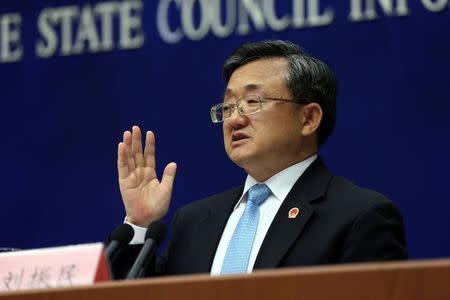China minister says regional problems should be solved within region

VIENTIANE (Reuters) - Regional problems should be solved by countries in the region and others should not interfere, a Chinese vice foreign minister said on Thursday, following an East Asia summit at which some leaders raised the issue of security in the South China Sea. Liu Zhenmin did not identify any countries, but was responding to a question from a reporter about whether the leaders of Japan and the United States had raised concerns about the South China Sea. "Outsider countries like to interfere whenever they see countries in the region strengthening relations and working together to solve problems," he told reporters. He said that two countries kept trying to "sow discord" during the East Asian summit by bringing up South China Sea "problems and the arbitration". "We moved past that (arbitration) issue during the July China-ASEAN foreign ministers meeting, we hope that such countries won't keep bringing up things of the past to stir up trouble and affect China-ASEAN relations." Liu was referring to a July ruling by a court in The Hague that declared illegal some of China's artificial islands in the sea and invalidated its claims to almost the entire waterway. Taiwan, the Philippines, Vietnam, Malaysia and Brunei also claim parts of the South China Sea, a vital waterway for global trade, which is also believed to be rich in energy resources and fish stocks. China has over the past year alarmed other claimants, and outside powers such as the United States and Japan, by re-claiming land on several disputed reefs through dredging, and building air fields and port facilities. Asian leaders played down tension over the South China Sea in a carefully worded summit statement, tiptoeing around the regional strains. Liu said ASEAN and China lacked an effective safety mechanism for the region and said they needed to improve cooperation to ensure the region's continued prosperity. He added that China and Philippines leaders had no time to hold bilateral talks due to busy schedules, but said the two countries had been communicating via various channels and said he had confidence their relationship could improve. Responding to questions on reports that Japan and Australia had discussed restraint in the South China Sea during a bilateral meeting at the summit, he said that such actions were "outdated". "Our safety cooperation needs to be achieved by East Asian countries, bilateral security discussions do not solve the region's problems but only their own issues ... These are actions that date back to before the Cold War." (Reporting by Brenda Goh; Writing by Martin Petty)

